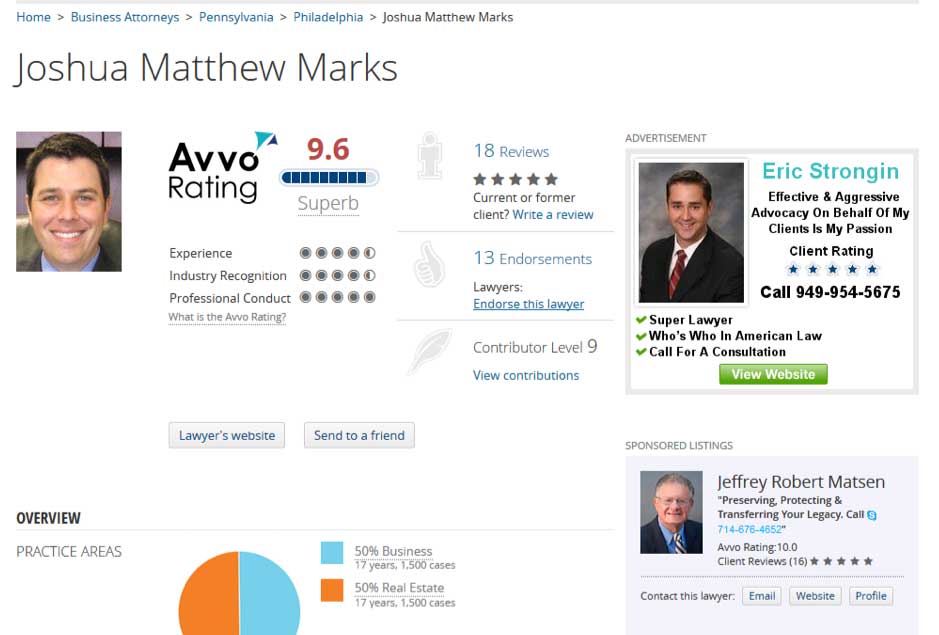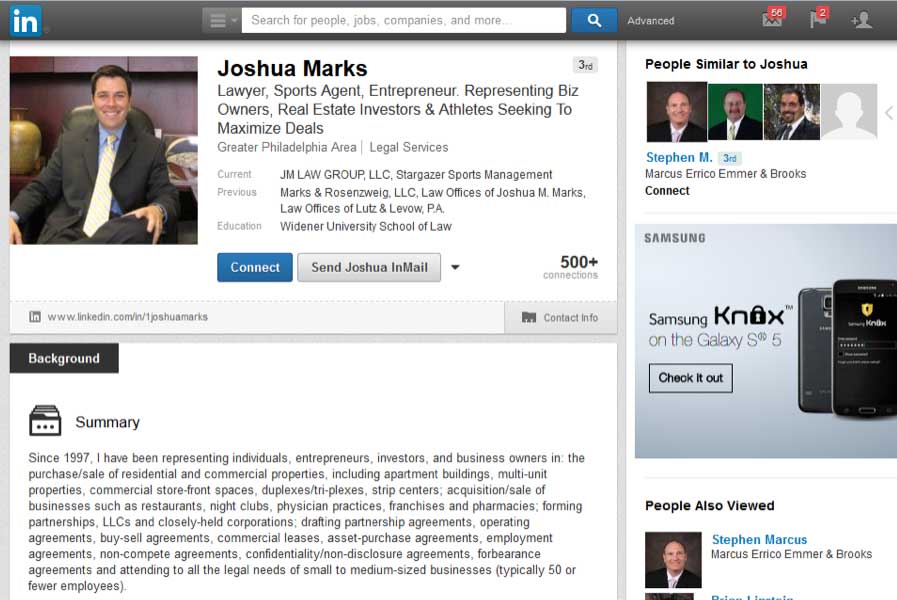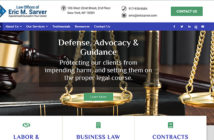40-50% of this Philadelphia and Cherry Hill lawyer’s business comes from online sources. Avvo, PPC, and his blog account for half of that online business.
Real estate took a beating over the past few years. With mortgage crises and plummeting sales value, it was inevitable that there would be a decline in sales. However, we have turned a corner across the country. As the market picks up, let’s look at how one commercial real estate attorney finds business.
I interviewed Josh Marks from the JM Law Group to discuss how he markets his commercial real estate business.
“We are based in Philadelphia, and have a satellite office in Cherry Hill, New Jersey. We primarily focus on commercial real estate and business transactions.”

1. Being Active on Avvo
Avvo is a large directory and information resource for people looking to connect with attorneys.
“I have found Avvo is really powerful. That has more to do with the strength of their SEO. Attorneys on Avvo should fill out their profile and benefit from their sheer size and strength.
“I filled out a complete profile on the website. This includes getting endorsements from clients as well as peer endorsements, which carry a lot of weight.
“Furthermore, writing articles and answering users’ legal questions is a great way to add to your profile. Once you have a strong profile, you are just benefiting from the sites’ SEO.
“It is a great tool, and I have a lot of people find me from that site. What happens is people do a Google search, and maybe they Google something like “real estate attorney.” Avvo is high on Google organic SEO. That is how they find me and other attorneys.

“Additionally, Avvo is a comprehensive rating site. Attorneys get a free profile that you need to claim. Once you do that, you fill out a lot of information, such as your firm contact information, your website, your practice, and years of experience. Then you can upload articles.
“From there, based on the practice areas you go on the forums and answer questions all types of legal questions from visitors who log into the site. Every time you answer questions, you get a certain number of points. They have a scoring system, and 10.0 (Josh has a ranking of 9.6) is the highest you can get on their site. Answering questions is the best way to improve your ranking on the website.
“A higher ranking gives users confidence that you know what you are doing when they call you. The rank gets people to look at your profile, and dig a little deeper. Most people indicate what a deciding factor were my reviews. They saw my score, and read my reviews, which gave them the confidence to call me.”
2. Pay-Per-Click Campaigns
“For my own site, I run a very limited Google pay-per-click campaign in the real estate world. People search specific key phrases, and I will come up on the right side of the page where they can click on my link and come to my website to get my contact information.”
3. Social Media
Finally, Josh is ramping up his social media usage. He understands that this needs to become a part of the mix, and is active on Twitter, Facebook, YouTube, and LinkedIn.

“Social media is another part of the marketing plan. I think a lot of attorneys are trying to do that as well. Many are not using it effectively, and I am throwing myself into the mix as well. I am trying to figure out how to create the right content for my business.
“The stuff that works well is the stuff that entertains people. The law can be dry, and putting out bland legal information is not always the best way to grab people’s attention and interact with you as an attorney.”
Content that educates your prospects must be relevant and useful for them to stay on the site. While you do not need a three-ring circus to get your message across, you might want to test out different ideas to see what works best for your target market. They will be thankful you are trying, and you will be glad you did not scare off prospects with boredom.
The Results
“Maybe 30-40% of my business comes from online. Avvo is probably as much as 40-50% of that amount. The rest of it [online-sourced business] comes from pay per click as well as my own blog.

The rest [the non-online half]of my business comes from relationship building with other professionals, which leads to referrals from former and existing clients. Additionally, speaking and writing are huge. The typical client comes from referrals from people you have built up a relationship with over time.”
Conversion Process
“They call in, and my assistant will schedule a phone consultation. We speak on the phone and learn about their situation. I am finding more and more, because I have a transactional practice, that many people do not want to come in the office. That gives me a lot of flexibility. I can work remotely.
People are very happy today to talk over the phone, exchange documents over email, and not have to do face to face. I leave it up to the client, and I understand that some clients need that reassurance. Then we will schedule a face to face.”
Final Thoughts
Joshua Marks put together a great system for bring in additional business. Leveraging the power of Avvo and pay per click ads, he has a constant stream of new clients. However, he understands that having clients is not the end goal.
That is why he is building relationships with clients for referral and repeat business. Considering that 50% of his business comes from online marketing and 50% comes from referral sources, this is a steady balance that works for his practice.



